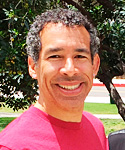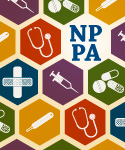November 12th, 2015
Towards a Better Understanding of the Advanced Practice Provider’s Role
Scott Cuyjet, RN, MSN, FNP-C
Recently, a registered nurse was demeaned for wearing a stethoscope in a beauty pageant by some who believe it is an instrument solely for use by doctors. Hopefully the consequent backlash resulted in educating the general public that it is a tool used by many in the medical profession. It was nice to see many doctors coming forth on behalf of nurses and explaining how much more frequently nurses use stethoscopes than doctors do. As an advanced practice provider (APP), I have encountered a great deal of camaraderie and respect among my MD peers, but a statement by a physician in a recent news article shows there is still work to be done in promoting better understanding of and respect for APPs.
 The October issue of the Journal of the American College of Cardiology contained a study assessing differences between physicians and advanced practice providers in quality of outpatient cardiovascular disease care. In their discussion, the authors summarize their results as follows: “The quality of outpatient CVD care measured by compliance with performance measures by APPs was equivalent to that of physician providers on most measures, and was even marginally better for APPs on some CAD measures.” They also note that compliance with CAD performance measures was low in both provider groups.
The October issue of the Journal of the American College of Cardiology contained a study assessing differences between physicians and advanced practice providers in quality of outpatient cardiovascular disease care. In their discussion, the authors summarize their results as follows: “The quality of outpatient CVD care measured by compliance with performance measures by APPs was equivalent to that of physician providers on most measures, and was even marginally better for APPs on some CAD measures.” They also note that compliance with CAD performance measures was low in both provider groups.
In an Oct. 12, 2015 MedlinePlus news article summarizing those study results, the authors quote Dr. Paul Heidenreich, a coauthor of an editorial accompanying the original research article, who states, “The findings confirm prior studies that show that advanced practice providers such as physician assistants and nurse practitioners can do as well or better than physicians at delivering simple but important care such as education, smoking cessation counseling, ordering cancer screening tests and vaccinations.”
My disappointment in the editorialist’s summation is this: You don’t need to be an NP or PA to do all but one (ordering cancer screening tests) of the tasks that he mentions. An NP or PA may do them as part of a visit but may also delegate them to a nurse or medical assistant. To me, the statement is demeaning to APPs, downplaying our roles in performing clinical tasks comparable to those of physicians: seeing patients, getting histories, doing exams, ordering labs or other tests, prescribing medications, and making referrals in complicated cases (primary care MDs also refer patients when cases extend beyond their expertise). Although the title of the news item is “Doctors, Nurse Practitioners Offer Comparable Outpatient Heart Care,” the key word of comparable (synonyms: similar, like), seems absent or overlooked in Dr. Heidenreich’s comment.
 As noted in the MedlinePlus article, “Harrington [editorial co-author] and Heidenreich also expressed disappointment at the poor standard of overall care,” but they did indicate that this was equal for physicians, NPs, and PAs.
As noted in the MedlinePlus article, “Harrington [editorial co-author] and Heidenreich also expressed disappointment at the poor standard of overall care,” but they did indicate that this was equal for physicians, NPs, and PAs.
It’s reasonable to assume that most of us enter our health care professions to help others. Our backgrounds, training, and levels of experience are all different. However, if we work together, those differences make us stronger and better health care providers for our patients.



Scott, I absolutely agree, but until the entire health care system is on board with what we do it will remain confusing and misunderstood by both our colleagues and patients. Until there is a recognized scope of practice I think we’ll be forever muddling around in the middle. I do appreciate that this study (like many others) does demonstrate comparable outcomes between NPs and MDs — and I think that needs to more openly acknowleded. In my organization if my quality stats weren’t equal to the docs I wouldn’t have a job …. that’s the economic reality.
Elizabeth,
I agree that organizations need to cover costs, and some need to make a profit, but they would not hire AAPs if we did not do at least a comparable job as this study states we do. In regards to things being muddled, in nursing there are LVNs, RNs, NPs, MSNs, DNPs, and many of them have different educational backgrounds so it is very confusing to patients.
There is only one MD and although there are slight differences in their basic training, it is for the most part uniform.
Thanks for taking the time to read my post and leave a response.
I have the impression that ,sometime, that some of the PA and NP did not receive adequate theoretical knowledge for their practice. Having only partial knowledge of an issue is ,sometimes worse than complete ignorance of it.
Francesco,
I am not exactly sure what you mean. The training is different for NPs, PAs and MDs, but I think the person also needs to realize their limitations and know when to study, consult or ask for help. As far as, “Having only partial knowledge of an issue,” it would be rare for a provider to know and have experience with every possible medical condition. Sometimes I have to look something up cause I have not seen a patient with it for years. Also, depending on a persons practice, we can become very focused it our use of our knowledge and skills.
Thank you for reading my post and your response.
I found it astounding that care delivered by a NP or PA is deemed equivalent to an MD/ DO care. Evidence does not summarize everything. Granted the additional providers know something but care is also dictated by a vast body of knowledge training and experience which cannot be measured by a study like this.
The author is rightfully disappointed and should continue to remain so until he can get into medical school residency and fellowship.These exist for a reason. There are no short cuts in Medicine
Nitesh,
This was just data from one study. Here is a link that provides many more over the last 18 years in regards to NPs. http://www.truthaboutnursing.org/faq/aprn_md.html
In regards to experience, medicine historically was an apprenticeship (p.474) https://books.google.com/books?id=afYzWG1FLroC&pg=PA474&lpg=PA474&dq=medicine+apprenticeship+history&source=bl&ots=M6UIQrU7F_&sig=Kjunk95A5_gjsOYShKlKDMVcMvM&hl=en&sa=X&ved=0CEYQ6AEwBmoVChMI1vWhl–TyQIVQ-VjCh3v7wpy#v=onepage&q=medicine%20apprenticeship%20history&f=false
NPs and PAs often have many years of working in the medical field before going to school to work on the theoretical knowledge needed to get their advanced degree and take their licensing exam. The information learned during this time is similar to an apprenticeship. You listen to someone’s lungs and hear abnormal sounds as an RN and notify the MD. They comeback with a diagnosis of pneumonia after listening and possibly ordering an x-ray. They then put in an order for the appropriate antibiotic(s) and the nurse gives it. The nurse is the one monitoring the patient most frequently and notices that the sounds resolve as well as any other symptoms the patient was having related to the pneumonia. After a few times of doing this they can recognize the pattern and even teach a green resident with nothing but theoretical training what a similar patient needs when they are smart enough to ask. Said nurse then decides that they could assess, diagnose and treat just as well as a primary care MD, and goes back to school with their years of experience to supplement it with theoretical knowledge.
During my training and experience as a RN prior to becoming an NP I learned to recognize my limitations and know when to consult. Just because someone is an MD or DO does not limit them from these moments as well.
Thank you for taking the time to read my post and for your thoughtful response.
I primarily see a NP when needed and find her highly knowledgeable and well trained. When necessary I see the MD. I feel health trends will see more FPPs working under physicians, with more than one in an office setting. This expediates the delivery of health care. Look at how our military medics give top notch care in the field or not. Midwives can also work under physicians with an obstetrician being called in for problem pregnancies/deliveries. Our health system is stresses and FPPs can bring relief. I have no problem with how my primary MD runs her practice. Many times in my practice, nurses and MDs discussed care that was planned. Team work and proper delegation enhance timely care delivery.
Anne,
Thank you for sharing your personal experience. The Background section of the Abstract of the article agrees with your future prediction. It states, “The current number of physicians will not be sufficient to accommodate 30 to 40 million Americans expected to secure health coverage with Affordable Care Act implementation. One proposed solution is to use advanced practice providers (APPs) (nurse practitioners and physician assistants).”
Thanks for taking the time to read my post and leave a response.
With all due respect to the people who work around me including PA and NP, the following needs to be noted.
1. The movement to establish advanced practitioners as equivalent to MD’ s is a political and economic one. Not equivalent in terms of competency and skill.
2. I have personally worked with many advanced practitioners and also taught PA’ s in a top US Med school PA program. I had a hard time time convincing the course supervisor that a topic I was given to talk can barely be an introductory talk on the subject. I was told to cover the topic comprehensively.
3. Most AP’s can be trusted to do a limited amount of work well for which they are trained. To give equivalent rights as MD and unrestricted license is not appropriate.
Please note for eg that a pulmonary fellow who has read more than 100 sleep studies cannot sit for a sleep medicine BC exam. They have to do a 1 year fellowship to be able to do that. The reason is standards are set high.
Most technology companies like Apple will never come into health care in a big way because regulation for technological devices is high. So is the case with newer drugs that are introduced.
4. A good number of AP’s can barely meet the standard and competence of a first year intern in practical terms but not the depth of knowledge the intern has.
Again not all MD are equal. We conult each other to give good care and the best care for the patient. It is a science and art we try to perfect all through our life.
5. Given these limitations even among such highly trained MD , it is surprising that AP’s ask for an equal footing.
6. Medicine is no longer an apprenticeship. It is a profession to be practised by a well trained professional in today’s world. Of course those who are trainees/ apprentices need to have an appropriate level of supervision.And then it is fine.
Hope I was able to drive home the message . We are all trained differantly and need to work together to better take care of the patient. However each one needs to realize one’ s limitation and not to step on others persons toes.
The current movement of AP is here to stay. It is also anticipated that at some point AP will get parity with physicians. This will occur because the train has already left the station. However it can be expected that this will also dilute our medical standards in a substantial way. It is evident in the way care is being delivered and the consults one gets to see in day to day life.
Thank you for allowing me to voice my opinion.
Nitesh,
Thank you for your well thought out reply, and for not disparaging APPs. It was not my intention to disparage MDs. I agree that, “We are all trained differently and need to work together to better take care of the patient. However each one needs to realize one’s limitation and not to step on others persons toes.”
Again, I appreciate you taking the time to read the post, and leave your replies.
Scott